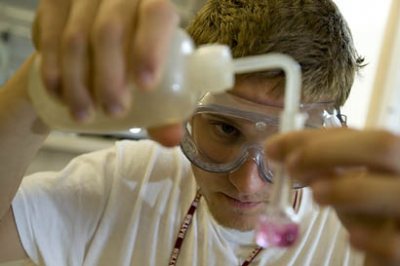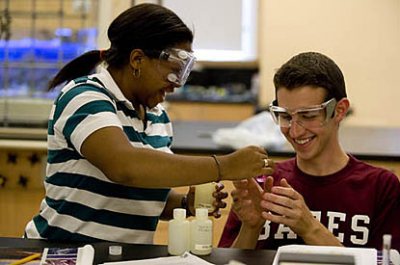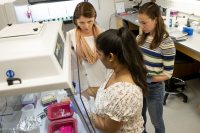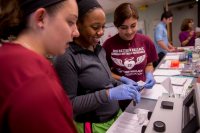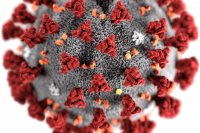
Summer program for math, science students going strong in second year
Squeezing the equivalent of two semester-long courses into just six weeks, the Hughes Summer Scholars Program at Bates is a real academic workout for the first-year students involved.
“But the program really focuses on giving support and making sure that we have the resources we need to succeed,” says Reid Christian, of Pownal, Maine, one of the 11 Bates students taking part in the second annual program.
Created by Bates and funded by the Howard Hughes Medical Institute, the six-week program aims to bring into science and mathematics a wider range of students, including students from groups underrepresented in those fields. Participants are competitively selected from students already accepted by Bates and who have shown an interest in the two fields.
“It enriches the sciences and math when investigators who represent the demographic complexity of the world bring multiple perspectives to challenging questions. And the program supports that,” says Pamela Baker ’69, a biology professor at Bates and director of faculty research and scholarship in the dean of faculty’s office.
“One of the main goals is to help students transition from high school to college life,” says Jennifer Koviach-Côté, an associate professor of chemistry who is teaching one of the two courses in the Hughes program.
The Hughes scholars receive full academic credit for the two courses during the June 22-Aug. 1 program. They live together in student housing, spending long days and late nights on academic work (and sometimes taking a break for recreation such as a hike up Tumbledown Mountain).
Koviach-Côté’s course deals with the physical configuration of molecules and how their forms affect their functions. The other course, exploring mathematical systems of diverse cultures, is taught by lecturer in mathematics Grace Coulombe, director of the college’s Math and Statistics Workshop.
The courses highlight differences between high school and college-level learning. They start students developing the time-management and study skills they’ll need to thrive academically. “We go much faster and expect our students to take more responsibility for their education than they do in high school,” says Koviach-Côté.
The Hughes program also introduces participants to the places, practices and especially the people of Bates. A key objective, in fact, is to encourage the Hughes scholars to bond and network with people who can advise, guide and support them as they adapt to college life. In addition to faculty, these supporters include upperclass Bates students who work as teaching assistants in the courses and the student “residence fellows” who live with the Hughes participants.
The Hughes scholars themselves constitute a mutual-aid group that will help ease the pressures of the regular academic year. “We’re really supportive of each other,” says Reann Gibson, a student from Mattapan, Mass. “We stay up late with each other, helping each other out with work. On the weekends, we’ve done a few trips.”
Is it making a difference? “Definitely,” she says. There has been some work, she says, “that I don’t think I could have done by myself without help from other people’s insights on the problem.
Lauren Okano, a Wyoming resident who participated in the inaugural Hughes Summer Scholars Program last year and is a rising Bates sophomore, confirms the importance of these relationships. “I came into the school year with faculty connections and 11 friends, and I was already adapted to living at Bates.
“Knowing some of the faculty around campus made the biggest difference,” she adds. “I knew exactly who to go to if I needed something in particular.” This summer, Okano won a competitive summer research fellowship enabling her to work as a research assistant with Baker, who is Helen A. Papaioanou Professor of Biological Sciences at Bates and an authority on the role of the immune system in periodontal disease.
One of the nation’s largest philanthropies, the Hughes Medical Institute is a nonprofit research organization dedicated to advancing biomedical research and science education in the U.S. Learn more at the HHMI Web site.
